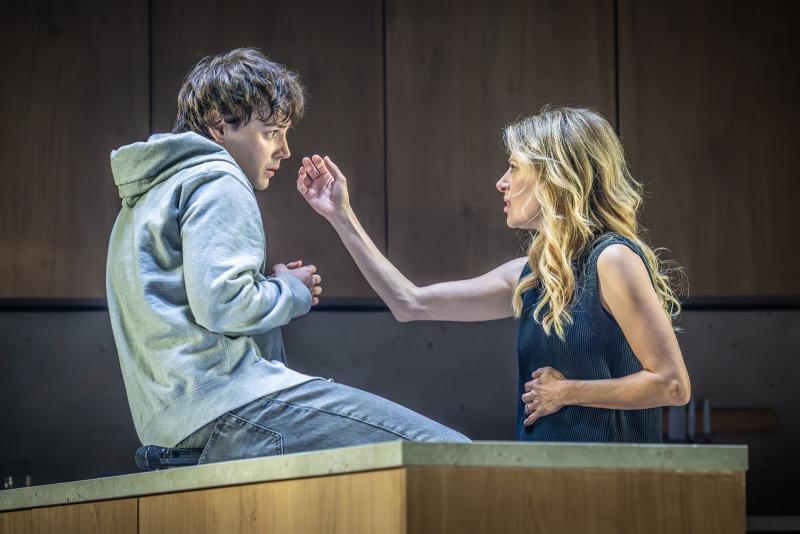Next to Normal, Wyndham's Theatre review - rock musical on the trauma of mental illness | reviews, news & interviews
Next to Normal, Wyndham's Theatre review - rock musical on the trauma of mental illness
Next to Normal, Wyndham's Theatre review - rock musical on the trauma of mental illness
Award-winning production comes to West End - bring your handkerchiefs

We open on one of those suburban American families we know so well from Eighties and Nineties sitcoms - they’re not quite Homer, Marge, Bart, Lisa and Maggie, but they’re not far off. As usual, we wonder how Americans have so much space, such big fridges and why they’re always shouting up the stairs.
But this squabbly, stereotypical family is not what it seems. Soon the mother is behaving oddly, there’s a “Here we go again” look in her husband’s eyes and the daughter withdraws, somewhat traumatised. Only the son, who has taken on a Puck-like status as an unreliable observer, appears at ease – we soon find out why.
 Next to Normal comes laden with awards from its 2009 residency on Broadway and from this production’s initial run at the Donmar Warehouse. It’s easy to see how it has garnered such praise, the house captivated by what is now a more familiar, more accepted story than it was 15 years ago. We all know parents like that, teens like that and we’ve all been touched, personally or at close quarters, by the scourge of mental health disorders and their resistance to treatment.
Next to Normal comes laden with awards from its 2009 residency on Broadway and from this production’s initial run at the Donmar Warehouse. It’s easy to see how it has garnered such praise, the house captivated by what is now a more familiar, more accepted story than it was 15 years ago. We all know parents like that, teens like that and we’ve all been touched, personally or at close quarters, by the scourge of mental health disorders and their resistance to treatment.
Cassie Levy keeps her Diana real. Her performance as a woman who is intermittently overwhelmed by depression, grief and delusions, is grounded largely in gestures more odd than frightening, histrionics held at bay. It makes it all the more shocking when her suicidal ideation produces blood and leads to the horrors of electroconvulsive therapy. It’s hard not to avert the eyes as she is strapped on to a gurney in an almost mediaeval scene.
Jamie Parker is the everyman husband and dad, loving his wife but perplexed as to how he should express that love when her mind is a roiling ocean of emotions. There’s no sugar-coating here – we see how mental illness can hollow out a relationship, its relentless undermining of the usual norms of reciprocity tilting the scales so far in one direction that the bar eventually snaps – but might be repaired.
Eleanor Worthington-Cox (Natalie) and Jack Ofrecio (Henry) (pictured above) are the geeky teens who fall for each other, she initially prim and proper and he the stoner, but as the pressure builds on Natalie, she starts to self-medicate on a similar cocktail of psychoactive pharmaceuticals as her mother, and their relationship is tested too.
It’s here that I suspect British audiences will struggle to keep up. Trevor Dion Nicholas (excellent as Diana’s two doctors) dispenses drugs which seem as ubiquitous as burgers in the USA but must surely just be names to many in the house – Xanax, Adderall, Prozac, Ritalin. He also gets the surreal number “Who’s Crazy/My Psychopharmacologist and I” which will bring back memories of Dennis Potter’s sublime The Singing Detective for many.
By far the most attractive character is Gabe (Henry, charming and funny as he may be, is just too wet really). Jack Wolfe has one of the best voices in the West End right now, sensational in his standout number, “I’m Alive” He also hits that sweet spot that leavens blunt malevolence with kindness, keeping us guessing as to his intentions and, as the narrative plays out, even his status in the family.
Tom Kitt provides a full-on rock score (one of many elements of the production that reminds one of Dear Evan Hansen) but the singers are miced-up which means that one can hear clearly Diana’s somewhat self-pitying “I Miss The Mountains”. Brian Yorkey’s lyrics are sharp and, if there isn’t quite a song as strong as Hansen’s “Waving Through A Window” it’s still a more than serviceable score that’ll have fans replaying back their favourites online.
The fault lies in Yorkey’s book, or perhaps more accurately, in its reception by your reviewer. Mental illness is something like Antarctica to me – I know it’s vast and dangerous, requiring all the right equipment to navigate safely, but it’s also featureless and unknowable. The second half especially had me tuning out as Diana’s problems worsened and I could relate only to the shadows they cast on her family. That puts a distance between me and the subject matter that proved (as it so often has in the past) insurmountable.
That said, I was fortunate to speak to friends much more familiar with the impact of mental illness on family life and they confirmed that the show was very much aligned with their experiences and what I had experienced as repetition was, in fact, a subtle delayering of that particular onion.
The musical, bold in conception, skilled in execution and acclaimed with modern theatre’s greatest accolade, a tearful standing ovation, has delivered. Just not for me.
rating
Explore topics
Share this article
The future of Arts Journalism
You can stop theartsdesk.com closing!
We urgently need financing to survive. Our fundraising drive has thus far raised £49,000 but we need to reach £100,000 or we will be forced to close. Please contribute here: https://gofund.me/c3f6033d
And if you can forward this information to anyone who might assist, we’d be grateful.

Subscribe to theartsdesk.com
Thank you for continuing to read our work on theartsdesk.com. For unlimited access to every article in its entirety, including our archive of more than 15,000 pieces, we're asking for £5 per month or £40 per year. We feel it's a very good deal, and hope you do too.
To take a subscription now simply click here.
And if you're looking for that extra gift for a friend or family member, why not treat them to a theartsdesk.com gift subscription?
more Theatre
 Deaf Republic, Royal Court review - beautiful images, shame about the words
Staging of Ukrainian-American Ilya Kaminsky’s anti-war poems is too meta-theatrical
Deaf Republic, Royal Court review - beautiful images, shame about the words
Staging of Ukrainian-American Ilya Kaminsky’s anti-war poems is too meta-theatrical
 Laura Benanti: Nobody Cares, Underbelly Boulevard Soho review - Tony winner makes charming, cheeky London debut
Broadway's acclaimed Cinderella, Louise, and Amalia reaches Soho for a welcome one-night stand
Laura Benanti: Nobody Cares, Underbelly Boulevard Soho review - Tony winner makes charming, cheeky London debut
Broadway's acclaimed Cinderella, Louise, and Amalia reaches Soho for a welcome one-night stand
 The Pitchfork Disney, King's Head Theatre review - blazing with dark energy
Thrilling revival of Philip Ridley’s cult classic confirms its legendary status
The Pitchfork Disney, King's Head Theatre review - blazing with dark energy
Thrilling revival of Philip Ridley’s cult classic confirms its legendary status
 Born with Teeth, Wyndham's Theatre review - electric sparring match between Shakespeare and Marlowe
Rival Elizabethan playwrights in an up-to-the-minute encounter
Born with Teeth, Wyndham's Theatre review - electric sparring match between Shakespeare and Marlowe
Rival Elizabethan playwrights in an up-to-the-minute encounter
 Interview, Riverside Studios review - old media vs new in sparky scrap between generations
Robert Sean Leonard and Paten Hughes make worthy sparring partners
Interview, Riverside Studios review - old media vs new in sparky scrap between generations
Robert Sean Leonard and Paten Hughes make worthy sparring partners
 Fat Ham, RSC, Stratford review - it's Hamlet Jim, but not as we know it
An entertaining, positive and contemporary blast!
Fat Ham, RSC, Stratford review - it's Hamlet Jim, but not as we know it
An entertaining, positive and contemporary blast!
 Juniper Blood, Donmar Warehouse review - where ideas and ideals rule the roost
Mike Bartlett’s new state-of-the-agricultural-nation play is beautifully performed
Juniper Blood, Donmar Warehouse review - where ideas and ideals rule the roost
Mike Bartlett’s new state-of-the-agricultural-nation play is beautifully performed
 The Gathered Leaves, Park Theatre review - dated script lifted by nuanced characterisation
The actors skilfully evoke the claustrophobia of family members trying to fake togetherness
The Gathered Leaves, Park Theatre review - dated script lifted by nuanced characterisation
The actors skilfully evoke the claustrophobia of family members trying to fake togetherness
 As You Like It: A Radical Retelling, Edinburgh International Festival 2025 review - breathtakingly audacious, deeply shocking
A cunning ruse leaves audiences facing their own privilege and complicity in Cliff Cardinal's bold theatrical creation
As You Like It: A Radical Retelling, Edinburgh International Festival 2025 review - breathtakingly audacious, deeply shocking
A cunning ruse leaves audiences facing their own privilege and complicity in Cliff Cardinal's bold theatrical creation
 Edinburgh Fringe 2025 reviews: Refuse / Terry's / Sugar
A Ukrainian bin man, an unseen used car dealer and every daddy's dream twink in three contrasting Fringe shows
Edinburgh Fringe 2025 reviews: Refuse / Terry's / Sugar
A Ukrainian bin man, an unseen used car dealer and every daddy's dream twink in three contrasting Fringe shows
 Faustus in Africa!, Edinburgh International Festival 2025 review - deeply flawed
Bringing the Faust legend to comment on colonialism produces bewildering results
Faustus in Africa!, Edinburgh International Festival 2025 review - deeply flawed
Bringing the Faust legend to comment on colonialism produces bewildering results
 Edinburgh Fringe 2025 reviews: Imprints / Courier
A slippery show about memory and a rug-pulling Deliveroo comedy in the latest from the Edinburgh Fringe
Edinburgh Fringe 2025 reviews: Imprints / Courier
A slippery show about memory and a rug-pulling Deliveroo comedy in the latest from the Edinburgh Fringe

Add comment